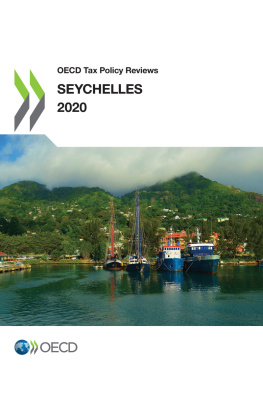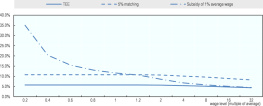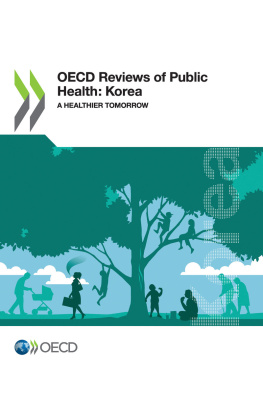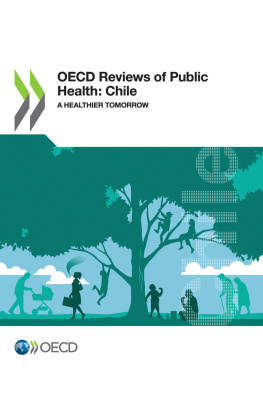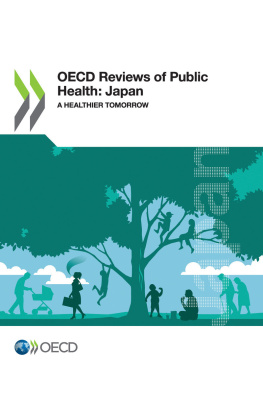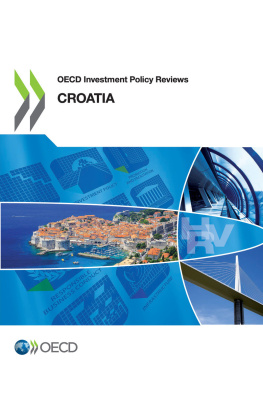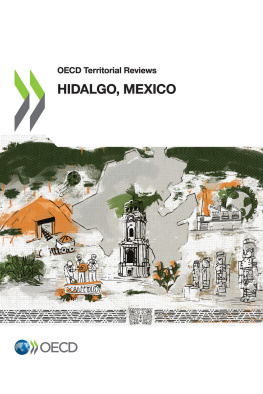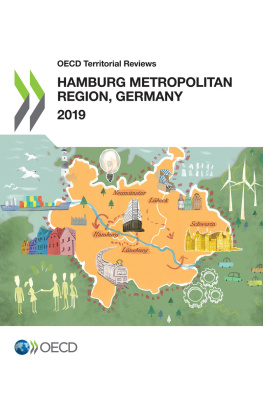OECD - OECD Tax Policy Reviews: Seychelles 2020
Here you can read online OECD - OECD Tax Policy Reviews: Seychelles 2020 full text of the book (entire story) in english for free. Download pdf and epub, get meaning, cover and reviews about this ebook. year: 2020, publisher: OECD Publishing, genre: Romance novel. Description of the work, (preface) as well as reviews are available. Best literature library LitArk.com created for fans of good reading and offers a wide selection of genres:
Romance novel
Science fiction
Adventure
Detective
Science
History
Home and family
Prose
Art
Politics
Computer
Non-fiction
Religion
Business
Children
Humor
Choose a favorite category and find really read worthwhile books. Enjoy immersion in the world of imagination, feel the emotions of the characters or learn something new for yourself, make an fascinating discovery.
- Book:OECD Tax Policy Reviews: Seychelles 2020
- Author:
- Publisher:OECD Publishing
- Genre:
- Year:2020
- Rating:5 / 5
- Favourites:Add to favourites
- Your mark:
- 100
- 1
- 2
- 3
- 4
- 5
OECD Tax Policy Reviews: Seychelles 2020: summary, description and annotation
We offer to read an annotation, description, summary or preface (depends on what the author of the book "OECD Tax Policy Reviews: Seychelles 2020" wrote himself). If you haven't found the necessary information about the book — write in the comments, we will try to find it.
OECD: author's other books
Who wrote OECD Tax Policy Reviews: Seychelles 2020? Find out the surname, the name of the author of the book and a list of all author's works by series.
OECD Tax Policy Reviews: Seychelles 2020 — read online for free the complete book (whole text) full work
Below is the text of the book, divided by pages. System saving the place of the last page read, allows you to conveniently read the book "OECD Tax Policy Reviews: Seychelles 2020" online for free, without having to search again every time where you left off. Put a bookmark, and you can go to the page where you finished reading at any time.
Font size:
Interval:
Bookmark:
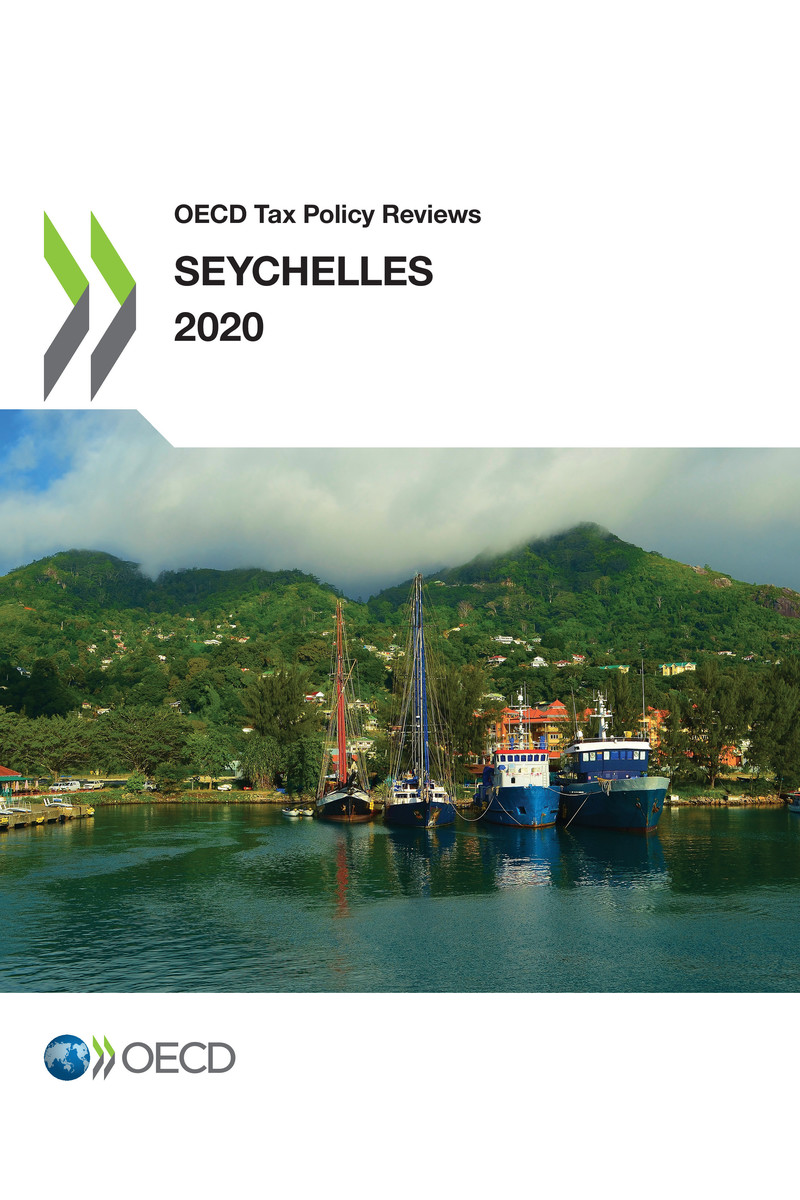
OECD (2020), OECD Tax Policy Reviews: Seychelles 2020 , OECD Tax Policy Reviews, OECD Publishing, Paris, https://doi.org/10.1787/cba38d19-en .
The information in this document with reference to Cyprus relates to the southern part of the Island. There is no single authority representing both Turkish and Greek Cypriot people on the Island. Turkey recognises the Turkish Republic of Northern Cyprus (TRNC). Until a lasting and equitable solution is found within the context of the United Nations, Turkey shall preserve its position concerning the Cyprus issue.
The Republic of Cyprus is recognised by all members of the United Nations with the exception of Turkey. The information in this document relates to the area under the effective control of the Government of the Republic of Cyprus.
This report is part of the OECD Tax Policy Reviews series. OECD Tax Policy Reviews are intended to provide independent, comprehensive and comparative assessments of OECD member and non-member countries tax systems as well as concrete recommendations for tax reform. By benchmarking countries tax systems and identifying tailored tax policy reform options, the ultimate objective of the Reviews is to enhance the design of existing tax policies and to support the adoption and implementation of tax reforms.
This report was led by Sarah Perret and written jointly by Gioia de Melo and Sarah Perret, under the supervision of Bert Brys. The analysis in this report is based upon the tax system as it was in place on 1 December 2019. It largely relies on business taxpayer microdata, provided on a confidential basis by the Seychelles authorities. Access to the microdata allowed simulating the effects of different business tax reform scenarios. The analysis is also based on OECD statistics, tax modelling tools and information collected during two fact-finding and stakeholder consultation missions that took place in July and October 2019.
The authors of the report would really like to thank Damien Thesee (Principal Secretary, Finance Department) and Seylina Verghese (Director General, Tax and Financial Sector Policy Division) from the Ministry of Finance, Trade, Investment and Economic Planning of the Republic of Seychelles, as well as Fred Morel (Deputy Commissioner General), Luisa Woodcock (Director, Taxpayer Services) and Roseline Lepathy (Director, Compliance Programme and Policy) from the Seychelles Revenue Commission. The authors would also like to acknowledge the contributions of other colleagues and stakeholders in Seychelles, who actively participated in discussions during the missions and provided additional information in the drafting stage of the Review.
The authors would also like to thank colleagues from the OECD Centre for Tax Policy and Administration, in particular Piet Battiau, David Bradbury, Stphane Buydens, Cline Colin, Daniel Fichmann, Tibor Hanappi, Anna Milanez and Kurt Van Dender, for their helpful input and feedback, as well as Karena Garnier and Natalie Lagorce for their assistance with formatting and communication.
Despite relatively robust growth in recent years, Seychelles faces a number of economic, social and environmental challenges including climate change, economic diversification, population ageing, inequality and enhancing the quality of public services. Many of these challenges will put additional pressure on public finances. In addition, Seychelles is planning major public investments to enhance infrastructure and strengthen resilience to climate change. As a result, the government of Seychelles will likely have to raise additional revenues in the medium to long run. Strengthening the tax system will be particularly important as the scope to use other sources of financing, including public debt and development aid, is relatively limited. Indeed, public debt levels, while drastically lower than a decade ago, remain relatively high, and grants from development banks and donor countries are expected to decline as a result of Seychelles newly acquired high-income status.
Overall, Seychelles total tax take is high compared to other African countries and comparable small island states. At 31.5% of GDP, Seychelles tax-to-GDP ratio is the highest across all the African countries covered by the OECD Global Revenue Statistics Database . Seychelles also collects high tax revenues as a share of its GDP in comparison to other small and highly tourism-dependent island economies. This means that potential changes to the tax system need to be carefully assessed, to ensure that these do not hurt growth or fairness.
Seychelles tax revenues predominantly come from indirect taxes and the business tax. VAT is the largest source of tax revenues, accounting for a third of total tax revenues in 2017. Other indirect taxes play a major role too, accounting for 30% of the tax revenues raised by Seychelles. The third largest source of tax revenues is the business tax, making up 21% of Seychelles total tax take. Personal income tax accounts for about 14% of total revenues, but revenues from social security contributions are low. Property and environmentally related taxes, on the other hand, represent only a very small share of total taxes raised. This suggests that these taxes could play a more significant role in Seychelles tax system.
The business tax burden is highly concentrated on a small number of taxpayers . Indeed, 30 companies accounted for almost 80% of the business tax take in 2017, while companies in the bottom 70% accounted for only 1.3% of business tax revenues. The 30 companies that contribute the most to business tax revenues are predominantly in the financial sector, wholesale trade and support activities for transportation. On the other hand, some businesses contribute only marginally to the collection of business tax revenues in comparison to the role they play in the economy. For instance, the tourism sector accounted for only 8% of business tax revenues in 2017, while it accounted for 33% of total value added in the country and for 47% of total VAT collected.
Font size:
Interval:
Bookmark:
Similar books «OECD Tax Policy Reviews: Seychelles 2020»
Look at similar books to OECD Tax Policy Reviews: Seychelles 2020. We have selected literature similar in name and meaning in the hope of providing readers with more options to find new, interesting, not yet read works.
Discussion, reviews of the book OECD Tax Policy Reviews: Seychelles 2020 and just readers' own opinions. Leave your comments, write what you think about the work, its meaning or the main characters. Specify what exactly you liked and what you didn't like, and why you think so.

